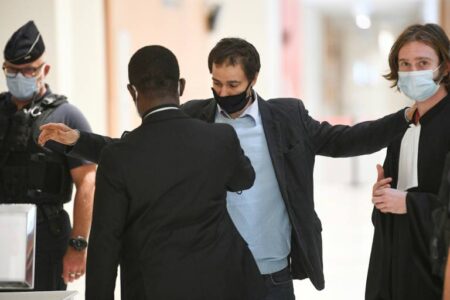
Former jihadi who radicalised the Charlie Hebdo attackers asks for forgiveness
The 39-year-old former preacher told the Special Assize Court that he “shared responsibility” for the actions of brothers Cherif and Said Kouachi, who murdered 12 people at the offices of the satirical newspaper.
“I would like to go back, to make things right, but it is not possible… Know that I am really sorry,” he said as he testified at the trial of 14 suspected accomplices of the Charlie Hebdo attack as well as a subsequent attack on a Paris Jewish supermarket.
Benyettou spent four years in prison for running a cell called the Buttes-Chaumont network, which was dismantled in 2005. It sent a dozen youths to join al-Qaeda in Iraq. He has now publicly renounced extremism and works as a truck driver.
French media reports say Cherif – who was arrested and jailed before leaving for Iraq – was delivering pizzas and dreaming of becoming a rapper when his religious beliefs hardened after meeting Benyettou.
“I encouraged Chérif Kouachi in his path as a jihadist, I supported his departure for Iraq in 2004,” Benyettou told the court. “I am undoubtedly linked to his journey, even if I did not participate in what he did afterwards.”
In a book published in 2017, Benyettou claimed he tried to reason with the Kouachi brothers before they carried out the massacre that saw tens of thousands take to the streets in the name of free speech.
Benyettou told the court that Chérif had become angry and adopted increasingly harder positions. “For him, the only way to solve something was through violence.”
In the aftermath of the attack on Charlie Hebdo, Benyettou presented himself to the intelligence services, saying he was ready to help the investigation. After his hearing, he was released.
Journalists present in the courtroom said that survivors of the attack and the families of the victims questioned why Benyettou was unable to use his influence to temper the brothers’ radical ideology.
The lawyers, too, seemed unconvinced, AFP reported. “You could be a false repentant who uses taqiya (concealment),” said Catherine Szwarc, who represents one of the civil parties.
Benyettou’s much-anticipated hearing in the Paris Special Assize Court had been initially set for 24 September, but was delayed after a Covid-19 case was reported in the home of one of the defendants.
French President Emmanuel Macron on Friday outlined plans for a law to fight the favouring of religious laws over France’s secular values – or “Islamist separatism”.
He said the plans would stem the growing influence of radical Islamists and prevent young people from becoming indoctrinated.
Speaking in Les Mureaux, north west of Paris where there is a large Muslim population, Macron warned Islamists, “the enemy of mainstream Muslims”, were infiltrating numerous aspects of ordinary life.
Source: RFI





